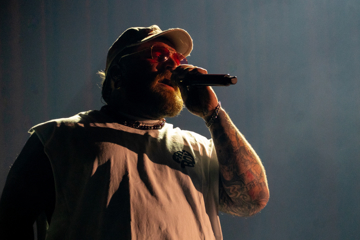Joan (The Rabble)
"A graphic and unapologetic display of trauma, transformed into raw, heroic strength."

We're living in the age of politicised art - not that art wasn't already political. But, as the zeitgeist has increasingly been saturated with the absurdity and fear of modern geopolitics, artists have stood on the frontlines of the counterattack, as instigators, firebrands and polemics.
Of course, we need these voices of dissent, but as the months have rolled on, as those acts of creative resistance have become increasingly prevalent, politicised art has come to feel somewhat hackneyed. Trump trouncing or Hanson bashing is now such low hanging fruit, that for those artists whose creative impetus is to challenge an audience, this path of least resistance has become a road too well-travelled.
There are, however, theatre-makers for whom tapping the political is more than a fad. Among them, The Rabble stand out, not only for their fiercely uncowed perspective, but also for the extraordinary sophistication of their productions. Since 2006, their experimental, multi-media powered feminist theatre has blown-open perspectives on womanhood and female identity with productions that are by turns heart-stoppingly beautiful and guttingly frank. While their latest piece, exploring the fate and horror of the life and death of Joan of Arc, could be viewed as a timely challenge to the misogynist patriarchy currently being promoted by the alt-right, I am in no doubt that these extraordinary artists would be making this piece even if our political circumstances were less bleak.
Don't miss a beat with our FREE daily newsletter
As faint pools of light throb over the inky black of the stage, figures are revealed in poses of devotional piety. Their gestures flicker and tessellate across the stage, as arms are flung open, chest offered up to heaven. Bodies crash to their knees, over and over, a demonstration of near-masochistic, humble submission - the pain of an individual is insignificant when compared to the suffering of the whole human race. This rhythmic ceremony, as bodies appear from the gloaming just to be subsumed, back into the shadows, is a scene of arresting grace. It will become a devastating counterpoint for the tortures that await this young woman.
The four actors on stage (Luisa Hastings Edge, Emily Milledge, Dana Miltins and Nikki Shiels) dutifully take their turn as the used and discarded Joan, trapped in a gaping, wrought and violent experience, before returning to the pack to be a distinctly masculine inflictor of suffering. One Joan is graphically violated as a perverse test of purity. Another is force fed cigar smoke until she is left choking and gasping on the floor. Repetition is a common theme - perhaps a signifier of the cycles of abuse that have persisted before and since Joan's tragic end. As Joan is forced to hurl herself onto an ever increasing pile of kindling, over and over despite the physical toll; it seems clear she knows what end awaits her.
Perhaps unsurprisingly for a production by The Rabble, it isn't enough to insinuate death by fire. A grass cloak is set ablaze, its acrid fumes forcing the audience to be physically connected to the experience of being burned alive. It's a moment of nauseating power; after witnessing a female body violated, battered, exploited and degraded, there will be nothing left, for all that suffering, but ash.
The piece ends with four monologues, the first spoken passages of the production. They trace out the life of Joan, as a young girl driven delirious by divine visions, as a hero decried as a heretic, as a human being describing the terror of burning to death, and finally as an abstract concept, a totem of inspiring resilience and desolating tragedy. Joan is an astonishing piece of theatre, for both its beauty and its harrowing truth. A graphic and unapologetic display of trauma, transformed into raw, heroic strength.
The Rabble presents Joan till 30 Apr at Theatre Works.







